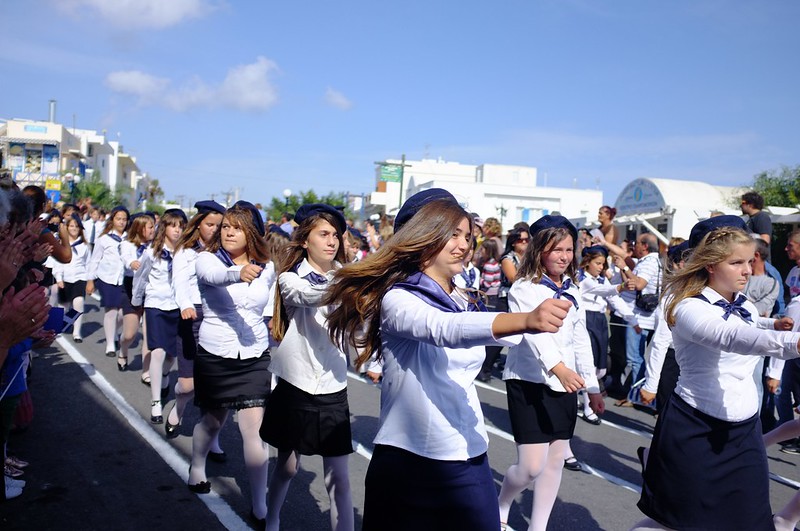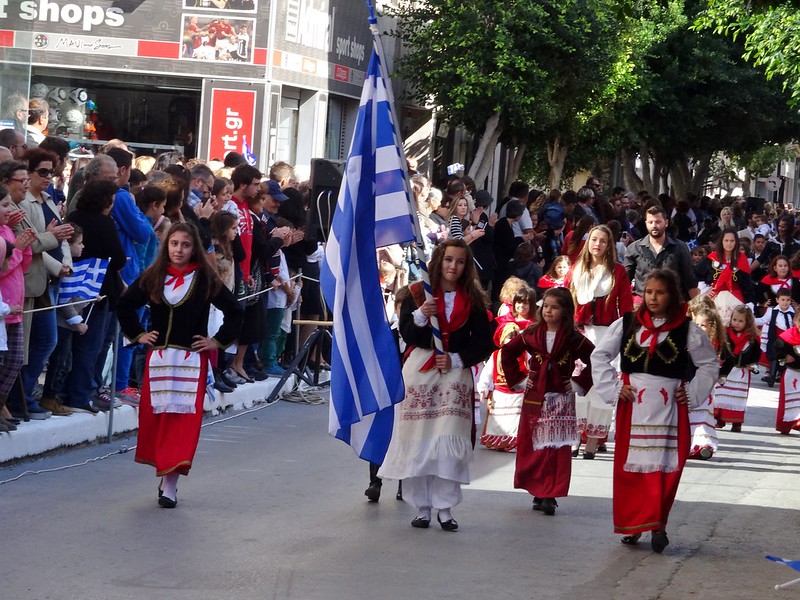Ochi Day
A Celebration of Pride and Unity-Greece’s Historic “NO”
2026/10/27
Every October 28th, all of Greece is awash in blue and white flags, enveloped in an air of resistance, pride, and unity for “Ochi Day” (“NO Day”). From Athens to the smallest mountain villages, military parades, folk dances, and the sound of brass bands fill the streets as the nation commemorates the historic moment in 1940 when Greece said “NO” to fascism. Whether you’re a history lover, a family seeking tradition, or a traveler wanting to feel the Greek spirit, Ochi Day is a living story of courage and community.
The crisp autumn air, the aroma of roasted chestnuts and koulouri (sesame bread rings), and a sense of excitement fill the streets, lined with fluttering flags. Locals and visitors stand side by side, moved by speeches, music, and the proud marches of children and soldiers.
Main Attractions
Parades, Speeches, and National Festivities
The biggest highlight of Ochi Day is the grand parades held in cities and villages across Greece. In Athens, the parade centers on the Tomb of the Unknown Soldier, with children, scouts, veterans, and the military marching as the president and dignitaries look on, while crowds wave flags and sing patriotic songs. Thessaloniki’s parade is even larger, featuring military vehicles, fighter jets, and folk dance troupes in traditional costumes.
Wreath-laying at war memorials, commemorative ceremonies, and speeches recounting the events of 1940 are held throughout the country. In villages, live music, traditional dances in the square, and feasts that last late into the night create an atmosphere of solemnity, pride, and intergenerational unity.
Costumes, Decorations, and National Colors
Ochi Day is visually stunning. Children parade in uniforms or traditional costumes-boys in fustanella skirts, girls in embroidered blouses and ribbons. Streets are decorated with blue and white flags, banners, and flowers, while balconies overflow with patriotic symbols. Many people wear Greek flag pins or sashes, and even pets sometimes sport blue and white outfits.
Cultural and Historical Background
Ochi Day commemorates October 28, 1940, when Greek Prime Minister Metaxas resolutely refused Mussolini’s ultimatum, rejecting Axis occupation. The single word “Ochi” (“NO”) became a national rallying cry and marked Greece’s entry into World War II. The day quickly became a symbol of unity, courage, and the unyielding spirit of the Greek people.
For Greeks, Ochi Day is more than a holiday-it is a day to remember those who fought for freedom and to reaffirm the power of unity. The annual parades, ceremonies, and stories passed down through families reinforce identity and pride for new generations, and for many, it is also a personal day to remember family members’ wartime experiences.
Participant Voices
“As a tourist, I was overwhelmed by the way the whole country paused to share in remembrance. A shopkeeper explained the meaning of Ochi Day to me, and I could feel the pride in every word.”
Fun Facts
- Ochi Day is a public holiday in both Greece and Cyprus, with schools and many businesses closed.
- “Ochi” is pronounced “O-hee” and means “NO” in Greek.
- In some mountain villages, WWII battle reenactments and plays are performed.
Festival Dates
Ochi Day is celebrated every year on October 28 throughout Greece and Cyprus. Be sure to join the parades and festivities in Athens, Thessaloniki, or any city or village for the full experience.
The event schedule is subject to change. Please check the official website for the most up-to-date information.
Upcoming Festivals
Kukeri(Surva) Bulgaria
Bulgaria’s Festival of Spirits, Fire, and Bells That Drives Away Winter
2026/01/22Dinagyang Philippines
Iloilo’s Thunderous Festival of Faith, Tradition, and Dance
2026/01/22The Northern Lights Festival (Nordlysfestivalen) Norway
A Tromsø Miracle: Music and Aurora Dancing in the Arctic Night
2026/01/25Carnavales de Ituren y Zubieta Spain
Ancient Echoes and the Festival that Awakens Spring in the Basque Mountains
2026/01/26Up Helly Aa United Kingdom
A Night When Fire and Viking Pride Blaze in Shetland
2026/01/29Winterlude Canada
A Wonderland of Ice, Light, and Smiles in Canada’s Capital Region
2026/01/30Carnival of Viareggio (Carnevale de Viareggio) Italy
A Spectacular Parade of Giant Papier-Mâché Masterpieces
2026/01/30Fiesta de la Candelaria(Virgin of Candelaria) Peru
A Grand Dance Festival of Faith and Folklore Echoing on the Shores of Lake Titicaca
2026/01/31Thaipusam Malaysia
A Pilgrimage of Prayer and Penance Illuminates Batu Caves
2026/01/31Jaisalmer Desert Festival India
When Rajasthan’s Golden Dunes Dazzle with Color and Culture


